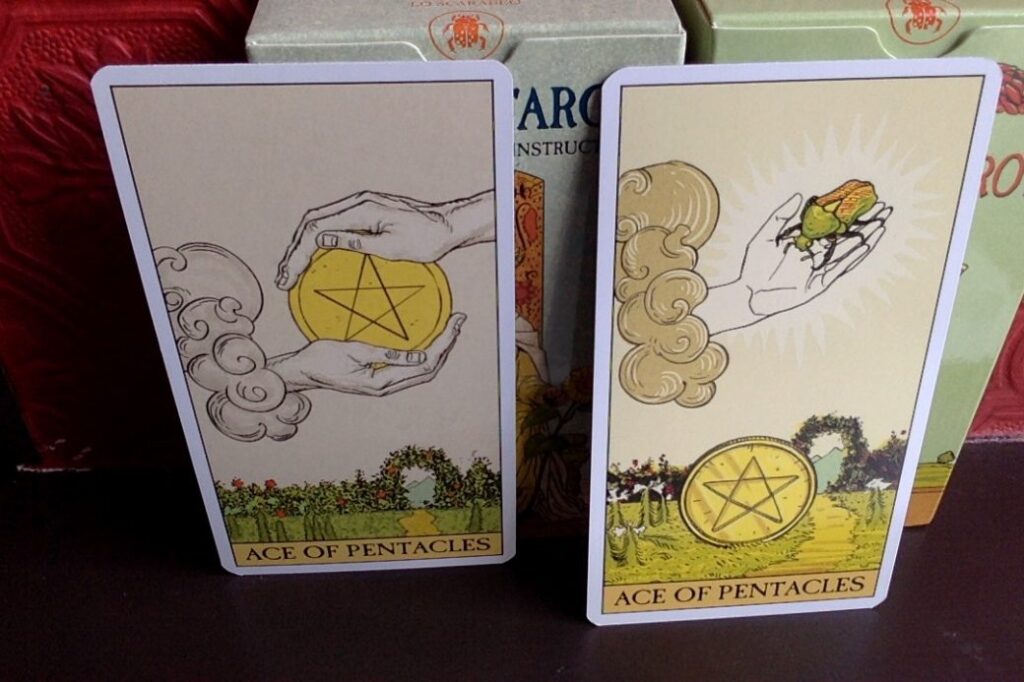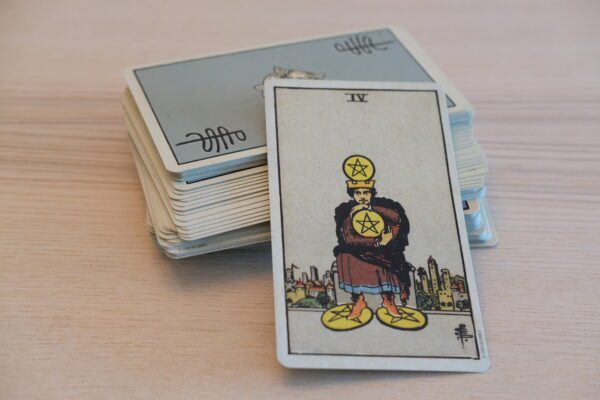Pamela Colman Smith’s Tarot deck, sometimes called the Smith-Waite Tarot Deck because she was commissioned by Arthur Waite, has fascinating pictures of coins – known as Pentacles because they all carry the five-star symbol.
Created in 1909, Pamela’s pictures have stood the test of time, but they also reflect the financial and business world as she knew it, over 100 years ago.
The cards, which were reissued in the early 1970’s, also tell a story about those critical economic times. Pamela’s Pentacles show extreme highs and lows! They also send a powerful message about values. What you value most; who you value most.
The Finances of Bohemian London
She was a freelance artist – a woman still in a man’s world – where her friends in the Suffragette movement had to fight for the same economic opportunities. Pamela’s finances were typical of those the ‘creatives’ and Bohemians in London at that time, experienced. Even Pamela’s friend, W.B. Yeats (who would go on to win the Nobel Prize for Literature) was chasing pennies.
In Australia you might see the pentacles in Pamela’s Tarot as dollar or two dollar coins. They might have meant gold sovereigns to Pamela, or perhaps pennies.
I am sure you know the work of Brigit Esselmont if you are a Tarot fan. Her website Biddy Tarot has a huge following.
She has a strong business background – unusual for a Tarot professional. So, how does Brigit see Pamela’s coins?
“The Suit of Pentacles Tarot card meanings cover material aspects of life including work, business, trade, property, money and other material possessions. The positive aspects of the Suit of Pentacles include manifestation, realisation, proof and prosperity. The negative aspects of the Suit of Pentacles include being possessive, greedy and overly materialistic…”
Pamela’s Pentacles and the Knight of Coins
The mood of the times was something the psychic artist Pamela Colman Smith channelled into her cards. She was working at a time when inflation and stuck wages in Britain began to bite. The middle and upper classes were visibly rich, especially in London. The working classes were struggling.
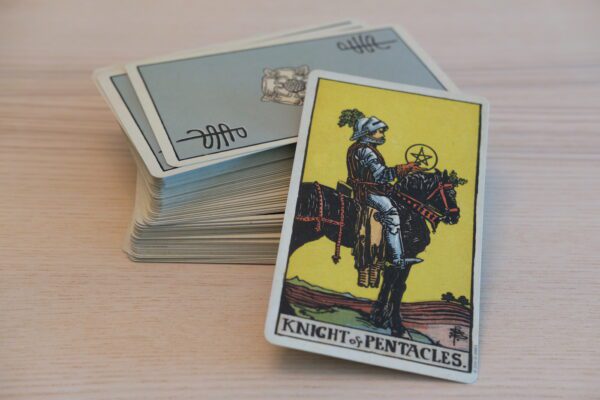
You can see this in the Knight of Pentacles. Here is a money man. A trader, perhaps, or a small business man, or a banker. He has the money, but will he pay? Will he strike a deal or lend? This is also the very image of a trade union mover and shaker who wants to negotiate on overtime and the bottom line.
The Strikes of 1910 and the Tarot
Strikes were on the rise when Pamela created her cards. Cotton and shipbuilding industries had lost jobs and by 1910, after her cards had been on sale for a year, unions found they had bargaining power and coal strikes rolled. It’s very interesting to look at the rolling brown landscape behind the Knight of Pentacles – it could so easily be a Kent coalfield like Tilmanstone Colliery, where my own family worked.
Stuart R. Kaplan and the Seventies
I mentioned that Pamela’s cards were revived in the Seventies. It’s interesting that this period, just after American businessman Stuart R. Kaplan bought his first Tarot deck, also coincided with strikes.
Kaplan was on Wall Street in 1968 when he found a deck at the Nuremberg Toy Fair in Germany.
In 1970 he acquired the rights to Pamela and Arthur’s deck – and the Pentacle cards had a story to tell once again. By 1973, when the reissued cards were part of a general boom in Tarot and astrology, the recession was well and truly here.
These coin or Pentacle cards tell tales about lump sums (redundancy settlements, perhaps) and also juggling money (the Two of Pentacles). They are about the search for money that may – or may not – be there at all (the Three of Coins).
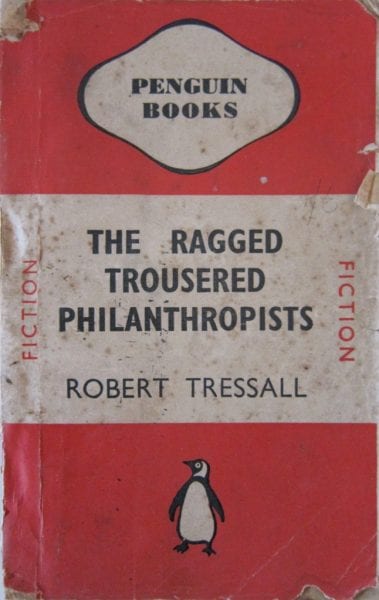
Sitting Pretty and Family Inheritance
They show people sitting pretty (the Four of Coins) and also the power of family inheritance. They made immediate sense in the early Seventies just as they had back in 1909.
Pamela created her cards at the same time that The Ragged Trousered Philanthropists was being written by Robert Tressell. This famous socialist novel was his account of working class struggle among construction builders. Like Pamela, Robert was buried in what was then known as a pauper’s grave – there was no money for an engraved headstone.
Know Your Price With the Pentacles
Many of Pamela’s images hint at the importance of knowing your price – valuing yourself. When her cards were reborn so was the Women’s Liberation movement and women began to strike for equal pay. This is another strange echo of 1909, as Pamela was friends with some high-profile Suffragettes and in fact created art work for the movement.
In 1968 just as Stuart R. Kaplan was purchasing his deck, the women of the Ford car plant in Dagenham got up from their machines and walked out on strike. Their revolution was captured in a fantastic British film, Made in Dagenham.

You can almost see the sisterhood in Pamela’s Three of Cups card. It shows female solidarity and celebration. The women of 1968 brought car production to a halt and their actions led to the landmark Equal Pay Act of 1970 across the United Kingdom.
Pamela’s magical, powerful deck – guided by the hand of occultist and writer Arthur Waite – and perhaps W.B. Yeats himself – is a master stroke. Rather than just painting one coin after another, she dreamed up visions of the future that were profoundly accurate.
Interpreting Pentacles for Yourself
In a moment, I’ll look at the first three cards in the Pentacles series to give you an idea of their deeper meaning.
Mary K. Greer writes that Pentacles “signifies physical, sensate energy. It indicates work, skills, money, body, security, results and the care or valuing of physical resources. It can also indicate being stuck, inflexible, stubborn or stressed and worried.”
You can see how utterly fixed and stubborn the man is in the Four of Coins card, the next one along. He’s not about to lose a single penny. Yet, what is his attitude actually doing for him?
Pamela must have known these types of people very well during her time in the New York art world.
In your own life, the Pentacles cards will bring you news of payments ahead – possibly pennies from heaven – but also the reality of doing it tough.
What is really interesting about these cards is that they are all open to change and movement. You can direct the action. Call the shots. Edit the pictures. Work with the imagery. Reshape your past, present and potential future. It’s really a state of mind, and many of Pamela’s cards show that.
Ace of Pentacles in the Tarot
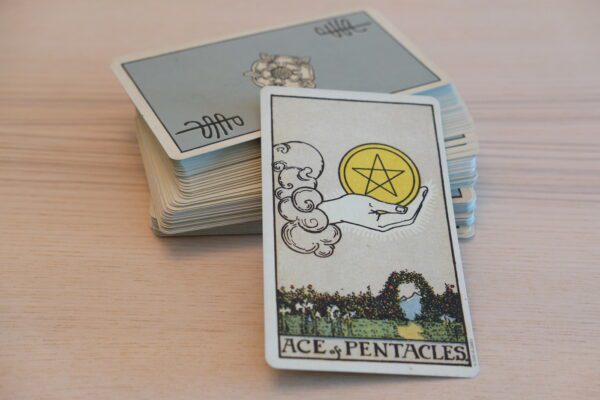
This is a fantastic image of potential wealth. One large lump sum, which is enough to pay for landscape gardening (see the fertile lawn and plants) or perhaps an extension to the house or apartment, which we can’t see. Maybe the property needs to be purchased, rather than rented. There is also a gateway leading to a world of adventure, across the mountains, in the distance. A lump sum might just play for a first-class, round-world trip.
The thing to remember about this card is that it’s all there to be claimed and made real. The heavenly hand is offering something which is not yet part of your everyday world. It’s floating. You have to be believe in it, trust it, want it and get it!
Quantum Science and Tarot Cards – What Erwin Schrodinger Tells Us about the Ace of Pentacles
Erwin Schrodinger (who made his famous cat thought experiment known across the world) lived in the same street as W. B. Yeats. This is important to your understand of the Tarot which Yeats helped to birth. Yeats was a poet, author, playwright and Golden Dawn magician. He was also just a few doors away from Schrodinger, who moved there after Yeats’ death. What his notorious cat told us was – everything is in two states until you look. Reality; the universe; the world is neither here nor there. This is rather like the coin in the card. It’s not here with you yet. It’s ‘there’ in the unformed universe you need to pop into reality. This idea of ‘popping’ universes is part of multiverse theory, which was an offshoot of Schrodinger’s weird cat-in-a-box.
Bringing the Ace of Pentacles Into reality
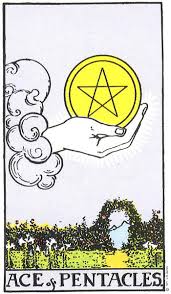 When you draw the Ace of Pentacles (Coins) in a Tarot reading there is potentially a large single sum of money to save or make, but you have to make it real. When Pamela Colman Smith was illustrating this card, she was herself being paid very little for a great deal of work. In fact, she was producing a deck which would go on to sell many millions of copies.
When you draw the Ace of Pentacles (Coins) in a Tarot reading there is potentially a large single sum of money to save or make, but you have to make it real. When Pamela Colman Smith was illustrating this card, she was herself being paid very little for a great deal of work. In fact, she was producing a deck which would go on to sell many millions of copies.
The Ace of Pentacles is a reminder that everything is hypothetical until you believe in it and strive for it. You can see the pentacle (hereafter called coin, for convenience) floating in the air. It is held in a heavenly hand – this must be Pennies From Heaven, like the song – surely?
Pamela Colman Smith and Money
Pamela Colman Smith created her deck at a time when the earliest stages of enquiry into what would be called Quantum Mechanics were developing. By the 21st century, scientists would come to know this as the new, proven, uncertain nature of reality. Everything is hypothetical until you pop it into being.
We have no evidence at all that Pamela knew anything at all about this new way of seeing reality. She was a Bohemian artist and illustrator – a noted artist – but not in touch with those circles. Instead her friends were freelance creatives, like her, or part-time occultists, like her business partner, Arthur Waite, who had a full-time job at Horlicks.
What Pamela (who was a natural channel or psychic) seemed to be picking up in her Ace of Pentacles/Coins card was the indeterminate nature of reality. Until you make the money real and use it to fund proper care of the beautiful garden, below, nothing will thrive or grow. It’s all a puff of smoke or a quantum cloud of possibilities, until you have faith and also do the work.
This way of thinking about reality is tied to the acceptance of the multiverse – a huge sweep of possible universes, which are popped in and out of existence just by the choices we make!
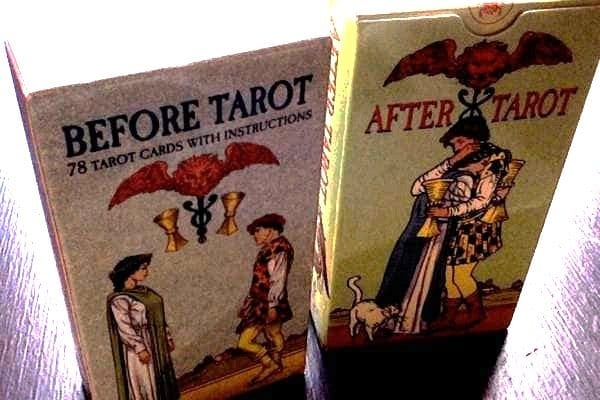
The Before Tarot, The After Tarot and The Ace of Pentacles
The After Tarot and Before Tarot decks with artwork inspired by Pamela, created by Giulia F. Massaglia (After Tarot) and Eon and Simona Rossi (Before Tarot) published by Lo Scarabeo takes this idea and runs with it. I really love these decks, which I think will give you helpful clues about how the Ace of Coins can work for you.
Pamela was a theatre designer who was inspired by stage costumes and sets, as I saw when I visited the beautiful surroundings at Smallhythe where she worked on her cards. A theatre is still there today along with the Shakespearean costumes of her mentor and friend, the actress Ellen Terry.
See what you can do with the Ace of Pentacles/Coins to bring action on and off the ‘stage’ set Pamela created – the garden. What can you do to work the image, direct it, hire new cast members, put on props and the rest? Truly, this is how science tells us so-called reality works. It really is about what we can see, believe and imagine to be possible!
In one card you can see two hands carefully holding the gold coin – which may be an Australian dollar or a British pound – or a solid gold collectable. There is tremendous care being taken here and you can see how Massaglia has added roses to the garden.
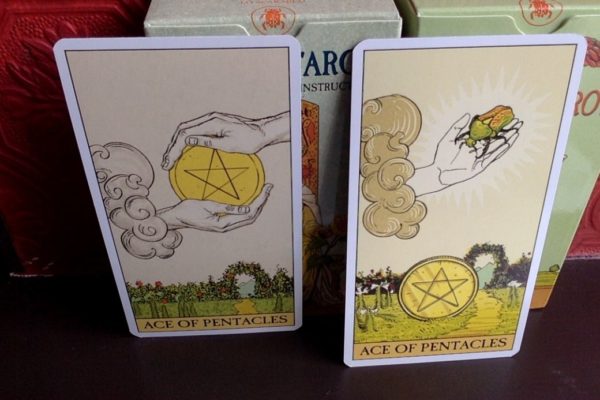
How to Personalise Your Ace of Pentacles Reading
In another card, you can see the money has fallen to earth. The hand is now holding a beetle. The word ‘beetle’ has so many connotations and I will leave it to you to interpret what it means for you. For me, it is about one of The Beatles making it after the Apple business is brought down to earth after the collapse of its retail wing in the Sixties. That particular Beatle is Sir Paul McCartney.
This brings to mind Beatles songs, like Money, and Can’t Buy Me Love. That’s how I work with the Tarot – through thought association and connections. Pro psychics work this way all the time.
You will be reading the Ace of Pentacles quite a different way, but I do urge you to look at the brilliant alternative interpretations of the Ace of Pentacles in the Before Tarot and After Tarot. What you can see going on here is very true to the way we know quantum reality to work.
Just the thought of that huge gold coin landing in the garden and coming down to earth totally transforms the card.
As the original was dreamed up by a woman who (records show) did not care all that much about being rich, but was passionate about being true to her art – there are also associated questions about selling out, and selling yourself short, and what is (or is not) up for sale in your world. In other words, values!
Exact Timing – Using Your Personal Birth Chart With the Tarot
I work with astrology and Tarot as you may know and if this card appears in a single-card reading, you are being asked to look at transits in Taurus and Scorpio in your chart right now, in the Second House and Eighth House of your personal horoscope, respectively.
This card will come up over and over again, as we are seeing the long-term transit of Uranus (radical change and revolution) in Taurus (currency, the economy, banks) beyond 2020 and as this planet moved in, during May 2018, when money laundering hit the headlines – you may be feeling the ripples of this and the cryptocurrency wave, for some time to come.
You’ll either be directly affected or indirectly hit by the changes, when this card comes up. Isn’t it interesting how much Pamela’s old drawing from 1909 resembles Bitcoin?
That was her rare gift – to channel and create images which always resonate through the centuries. I am sure you can see the associations between the Ace of Pentacles and the following list items – many of which are buzz words for Taurus, Scorpio and the Second House and Eighth House of your chart. If you are a Premium Member you can see if you have factors here at a glance, and by using the front page of this website, you can also see if you have weather or traffic in those signs too!
Ideas to Work With – The Ace of Pentacles/Coins and Your Future
- Bitcoin
- Cash
- Currency Exchange Rates
- Banking
- Wall Street
- Gold
- Property
- The Environment versus Development
- Savings
- Debt
- Credit Cards
- Salary
- Inheritance
- Lotteries
- Gambling
- Sales
- Shopping
- Value
- Valuables
- Values
Develop Your Reading by Seeing Life as Pamela Colman Smith Saw It!
Feel free to sketch, colour or add collage to a journal using this card. You can see how in the Before Tarot and After Tarot, Giulia F. Massaglia and Eon and Simona Rossi have breathed new life into Pamela’s old vision. What can you add as well?
As the answer to any question you have now, the answer is money. Not in your hand yet, or anybody else’s hand – but potentially, it can be made real. So much depends on how you feel about your finances, economics, capitalism, business, charity, philanthropy, debt and all the rest. This helps you drill down into what you will or will not permit into your world.
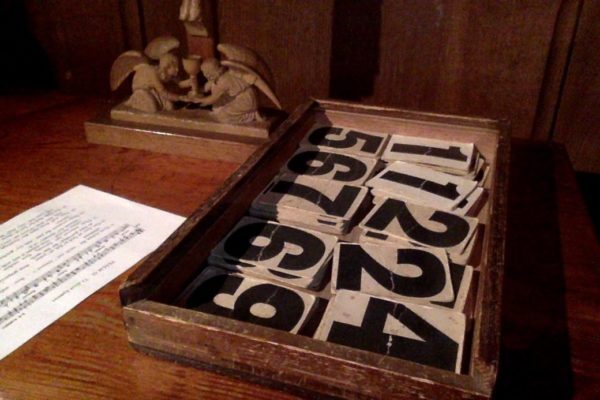
Pentacles, Coins, Numbers and Sums – How You Account For Your Life
The brilliant artist and psychic behind the cards, Pamela Colman Smith, was very likely laid to rest in the church in Bude, Cornwall where I photographed these hymn numbers. We just don’t know, because she was buried in what used to be known as a Pauper’s Grave. The woman who created the art for the most successful Tarot deck of the 20th and 21st centuries (big business indeed) passed away, with so little, that she was laid to rest in an unmarked place, occupied by another coffin.
Those were the rules of the life and times she inhabited. Yet, you could say the priceless gift of her art was to make her immortal – loved – respected – by the millions who use her cards, even though they may not always know her name.
These numbers are for hymns at a local Bude service. Yet they also bring to mind the digits of any large transaction. Dollars, pounds and euros. They could be numbers in a ledger book or bank statement. What do they say to you?
It’s by thinking around the subject of money, and numbers, and what is added, subtracted or divided in life, that you begin to dig more deeply into the meaning of the Ace of Pentacles and enrich your life.
Two of Pentacles in the Tarot
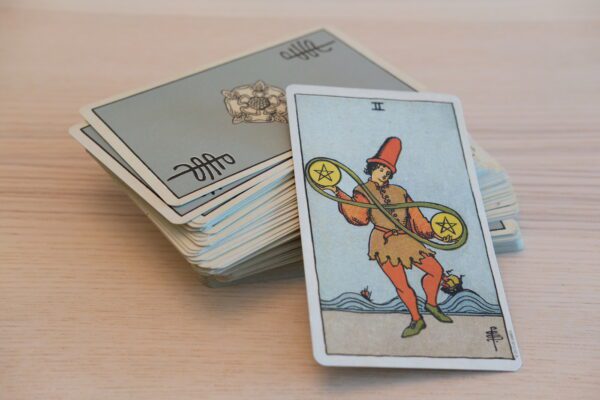
The Two of Coins or Two of Pentacles, is a really good example of how Pamela Colman Smith took a standard Tarot image and reinterpreted it, according to her own experience. When you draw this card in a reading, from her deck – created with Arthur Waite – often called the Smith-Waite Deck – you are seeing money through her eyes. Pamela was a freelance artist, author and storyteller who juggled money.
Mary K. Greer, who must have the best Tarot research website in the world, cites Pamela’s well-known letter to her artistic mentor Alfred Stieglitz, back in 1909 when she was completing her commission to produce 78 cards for Arthur Waite and the Rider publishing company.
We find in a letter to her mentor, the pure cry of the Two of Coins – “I just finished a big job for very little cash!”
Arthur Waite, who was manager of the Horlick’s Food Company from 1900 t0 1909 and also editor of its journal, managed to place his own poetry and short occult pieces, as we find today in old copies of Horlick’s Magazine and Home Journal for Australia, India and the Colonies.
This is another classic Two of Coins issue. How do you pay the bills, but also earn the rewards of work you love? Waite could not make a full-time living from Tarot, nor any other aspect of the Occult, including astrology, in 1909.

Understanding an Unbalanced Budget in the Tarot
An unbalanced budget is shown here, with credit on one side, and debt on the other. Money coming in and going out. Money  saved and being spent. This figure-eight loop is a clear picture of a situation which goes on forever (the figure-eight is the infinity symbol, often drawn by Pamela). In other words, money always goes in and out, like the tide. It was like this before you were born and it will be like this after you pass. Pamela herself, passed away with no money left after debts were settled. Ironically, her famous deck of Tarot cards, created with Arthur Waite, went on to make other people money after she passed. Pamela (pictured, captured in the wonderful new book Pamela Colman Smith – The Untold Story) was a woman in a man’s world in 1909, when she created the cards. She was a true Bohemian who worked on the cards, as she said in a well-known letter, for very little money. Pamela projected her own experience into the Two of Coins card, which shows someone juggling, trying to balance, ungrounded, off-centre while the two coins loop the loop – perhaps it is an infinite loop – of debts/credits.
saved and being spent. This figure-eight loop is a clear picture of a situation which goes on forever (the figure-eight is the infinity symbol, often drawn by Pamela). In other words, money always goes in and out, like the tide. It was like this before you were born and it will be like this after you pass. Pamela herself, passed away with no money left after debts were settled. Ironically, her famous deck of Tarot cards, created with Arthur Waite, went on to make other people money after she passed. Pamela (pictured, captured in the wonderful new book Pamela Colman Smith – The Untold Story) was a woman in a man’s world in 1909, when she created the cards. She was a true Bohemian who worked on the cards, as she said in a well-known letter, for very little money. Pamela projected her own experience into the Two of Coins card, which shows someone juggling, trying to balance, ungrounded, off-centre while the two coins loop the loop – perhaps it is an infinite loop – of debts/credits.
The importance of the ship in the background cannot be overestimated. In Pamela’s day, a good deal of trade relied on shipping, so the vessels you see being tossed around on the waves are a symbol of the national or international business picture. The national economy and the world economy. Today, of course, it relies on the internet more than shipping. This beautiful illustration was created by Pamela (below) for another project and shows a recurring motif in her work – the ebb and flow of uncertain tides. Seeing life through her eyes helps you understand the Two of Coins better.
Working the Cards – Using the Before Tarot and After Tarot
As you may know from my workshops on the Tarot, I believe that Pamela was channelling the ‘new’ scientific knowledge about quantum mechanics when she created her deck. The thought had never occurred to me, until I went for a walk in Dublin and saw how closely W. B. Yeats (Pamela’s friend and fellow Tarot enthusiast) had lived next to Erwin Schrodinger. On the other side of Merrion Square, lived Oscar Wilde, whose wife Constance had also mixed in the same magical circle as Pamela and William Yeats. Thus, one of the fathers of quantum mechanics – the new proof of an uncertain reality – was a stone’s throw away from some of the most famous members of The Golden Dawn.
I’m sure you’ve heard about the Before Tarot and After Tarot decks. Published by Lo Scarabeo, with artwork by Eon and Simona Rossi and Giulia E. Massaglia, they show Pamela’s cards reimagined, as if the action was yet to begin – and later, as if the action was being completed. They give you a fantastic window into the creative possibilities of the Two of Coins. What happened before the money started being juggled? What might happen if the juggler (yourself) takes control and the ship comes in to shore? What other possibilities can you see?
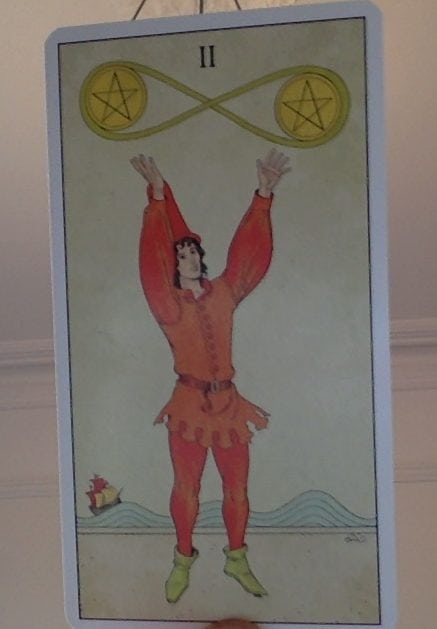
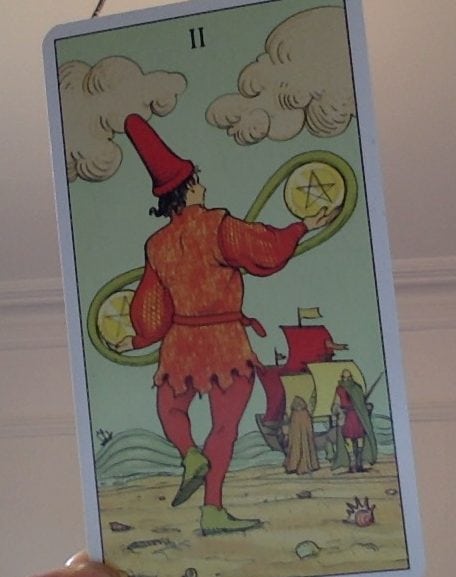
The Two of Coins and Financial Flexibility
The Two of Coins card is most likely to turn up when you are also having transits through Taurus (cash flow) and Scorpio (business, banking) in your personal birth chart. So, for example, you may find you have unpredictable Uranus passing through Taurus and your Second House of money, or perhaps he is opposing your Scorpio factors in the Eighth House.
Financial flexibility is the key to this card. You can’t hope for stability, unless the ships come to shore and stay there (but how will they trade?) The sea will always be wild and stormy unless we can control the elements! What this card tells you is that there some things you can master and some things you have to allow. What you can most certainly master is your own capacity to balance your budget. Perhaps, like Arthur Waite (below, Wikimedia Commons) you need to find a way to pay the bills but balance it with your need for work that doesn’t pay so well. In Waite’s time, this was the Tarot. It would take several decades and its rediscovery by Stuart R. Kaplan from U.S. Games Systems, before it paid its way.
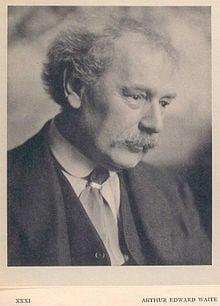
It all comes back to the wobbly, unstable, uncertain man in the card. This is you (or it may be someone else, if that was your question). So much to juggle! So much to try to add up! How can one calculate the priceless rewards of work that is loved, against the cost of working in a field that may be more about practical necessity than cash? We don’t know how Waite (pictured) felt about running Horlicks, but he must have loved putting the occasional piece on hypnosis into its house magazine for the colonies.
The trick with the Two of Coins is to centre, focus and concentrate. Who or what matters most to you? Can you put a price on peace of mind, stability, integrity? How about pricing soul satisfaction against the weekly pay cheque? This postcard (below, from Wikimedia Commons) shows the New York Stock Exchange in 1909, the year Pamela created her Two of Coins card. You can see all the business of trade, in the shape of the financiers to the left of the building. The Wall Street Crash was 20 years away but Pamela may have clairvoyantly seen aspects of it, when she dreamed up this unusual image of a man frantically juggling two golden coins while a larger and smaller ship are tossed around in the background. What is the Two of Coins saying to you and how can you work with the image to change it, to your satisfaction? Pamela’s illustrations often hid coded imagery – for you to interpret.
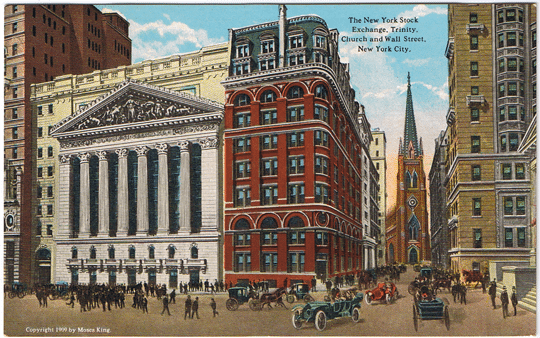
Three of Pentacles in the Tarot
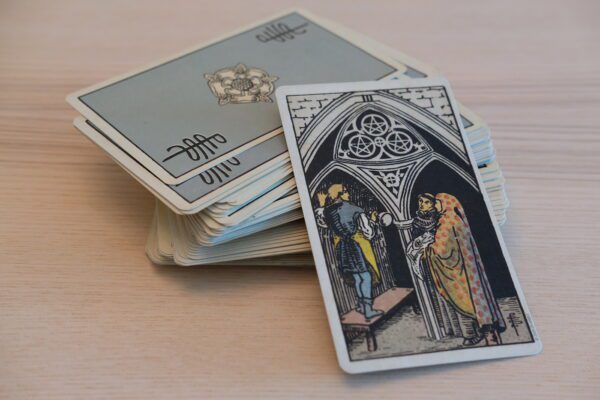
The Three of Pentacles, or Three of Coins, is about the search for missing money, which may (or may not) be there. The people in this card, created by Pamela Colman Smith in 1909, are a motley crew. A monk (who must have taken vows of poverty). A jester – who hardly knows much about accounting. And, someone who is in service to others – just look at the apron – so an employee, not an independently rich person. They are peering into the gloom with a sketch or drawing to guide them and the ghost of three coins hangs overhead – surely one-third for each of them?
Moving from Past, to Present, to Potential Future With Tarot
I work with the Before Tarot, After Tarot and original Smith-Waite Tarot, all of which spin Pamela’s original pictures in different ways. She was working at a time (1909) when scientists were making huge leaps with time. It seems only fitting that today, with our new knowledge of quantum uncertainty – reality shifts shape according to our point of view and beliefs – that we should also be working with shape-shifting cards.
As you can see below, from left to right, the Before Tarot shows an ordinary person (middle-class average, no great wealth) glimpsing the promise of money hidden in a gloomy and mysterious space. He’s tempted enough to stop and consider a search even if there are no guarantees.
Working with Time and the Tarot – The Past, Present and Potential of the Three of Pentacles
In the middle card we are brought into the present – the now of the card you have just picked. He’s now found a couple of people to help him. A diagram or map is in hand. Is it all hypothetical or have they found something that might just lead them to serious money or buried treasure? The only issue is – look who he’s working with. A jester and a monk. They are hardly financial professionals! Is this some kind of joke? Is this funny money? Or are they on the right track?
The ‘after’ card shows them getting closer. They’re within the inner sanctum now and the map is on the wall. The jester (joker) is tracing it with a pen while the monk looks on, slightly removed from it all. The working person who started the search seems frustrated, pent-up, ready for action – not more theories! What are these cards saying to you?
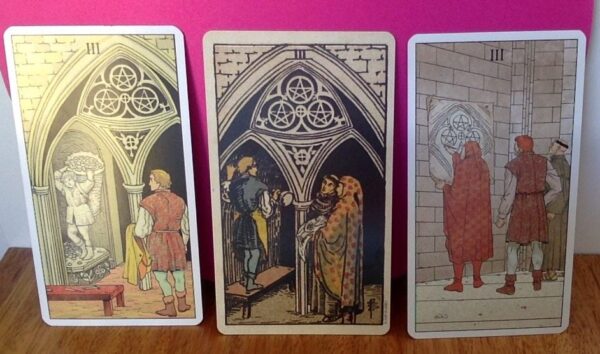
Three of Pentacles in Before, After Tarot (Adams)
Seeing the Three of Pentacles Through Pamela’s Eyes in 1909
When working with the deck created by Pamela Colman Smith under guidance from Arthur Waite, we need to look at life as it was around 1909 when she picked up her paintbrushes.
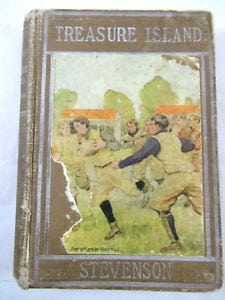
This was a couple of years after a new edition of Treasure Island had made its way into the shops. This is a 1907 copy currently being sold on eBay for rather more than the original price. You might call eBay a quest for money (money to be saved or made) but there is a mysterious quality to it – none of the prices are known factors, until you look. Treasure Island is of course a book about the search for hidden wealth. Everything hinges on that map – but also the abilities and intentions of those looking!
Look Deeply at the Motives of the Three People in the Three of Pentacles
When you draw the Three of Pentacles/Coins you are being asked to look deeply at the motives of the people you are recruiting. Look at their experience and expertise too. Do you consider yourself the protagonist in this story? Are you the regular, middle-class or middle-income person with the apron or uniform, who is obviously not of wealthy stock? Maybe you would consider yourself to be the joker/jester figure. A funny person; an amusing person; an entertaining person. Yet, how good are you with that other side of your brain?
The monk figure in the card is another puzzle. Pamela drew a cathedral in her original illustration of the Three of Pentacles so it makes sense to have a holy brother in the frame, with his simple robe, shaven head and sandals. Yet – why is he looking for money? Does he have a claim on it, through the location or institution? Questions like this can help you dig deeply into the meaning of the card. Perhaps Pamela was influenced by Treasure Island!
The Panic of 1907 and the Business World
The Panic of 1907 was just two years into the past when Pamela was asked by Arthur Waite to illustrate the Tarot in a deck he hoped would be a solid seller in Christmas 1909. A magazine from that era, Puck, shows the nervous atmosphere on Wall Street that year. As a leading figure at Horlicks in Britain, Waite would have been well aware of the ruckus across the pond two years before their Tarot cards emerged. The themes of looking for money and recovering lost funds and tracing the missing millions and searching for shares are common with the Three of Pentacles. Pamela and Arthur lived through it. Both had connections to New York. He was born there and she studied art there.
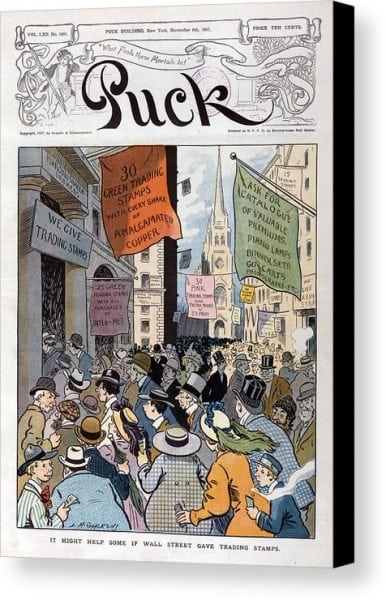
Inheritance, Legacies, Pension Funds, Superannuation, Taxation Refunds, Debt Recovery
In 1909, when Pamela’s cards appeared on sale for the first time, Countess Beatrice Forbes married. Her wealth, and that of her husband, were talking points in newspapers and in high-society magazines throughout the year.
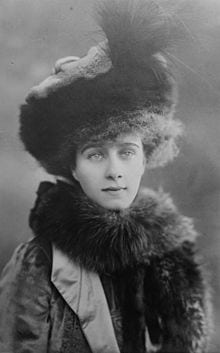
Pamela was creating her Tarot at a time when inequality meant that the gateway to wealth for a woman was often solely through her inheritance (from her parents) or from the added benefits of marrying money. Thus, the Three of Pentacles/Coins may be about three sons looking for their mother’s legacy, or perhaps three brothers or cousins on a quest for their share of a family fortune. Today, we associate this card with missing superannuation or pension funds, taxation refunds and also the recovery of debt. If you are curious about the astrology in your chart which may be pointing to this, have a look at anything in Taurus in your Second House and Scorpio in your Eighth House.
Using Astrology for Timing With the Three of Pentacles/Coins
If you were born in the Sixties, for example, you have have Neptune in Scorpio in your Eighth House, natally – using the Natural House system. So, the idea of mystery and money is woven into your life! Perhaps you are having transits to natal Neptune when this card comes up. If you are looking for specific timing with the Three of Pentacles/Coins, it can be useful to have an idea of the transits of Uranus (going through Taurus for many years) which may be aligning with your own Taurus placements in the Second House of cash flow, bills, debts, banks, shares, business, charity, assets and so on. You can use your personal birth chart, if you are a Premium Member, to get a second opinion on what is actually unfolding (and how good your chances are) when the Three of Pentacles comes up. If you are fortunate enough to have Jupiter in Scorpio or Taurus, for example, it may well be that there is a lot of money waiting to be discovered and even if the search party isn’t exactly a crack team of financiers, you may well hit gold. Now, how to share?

